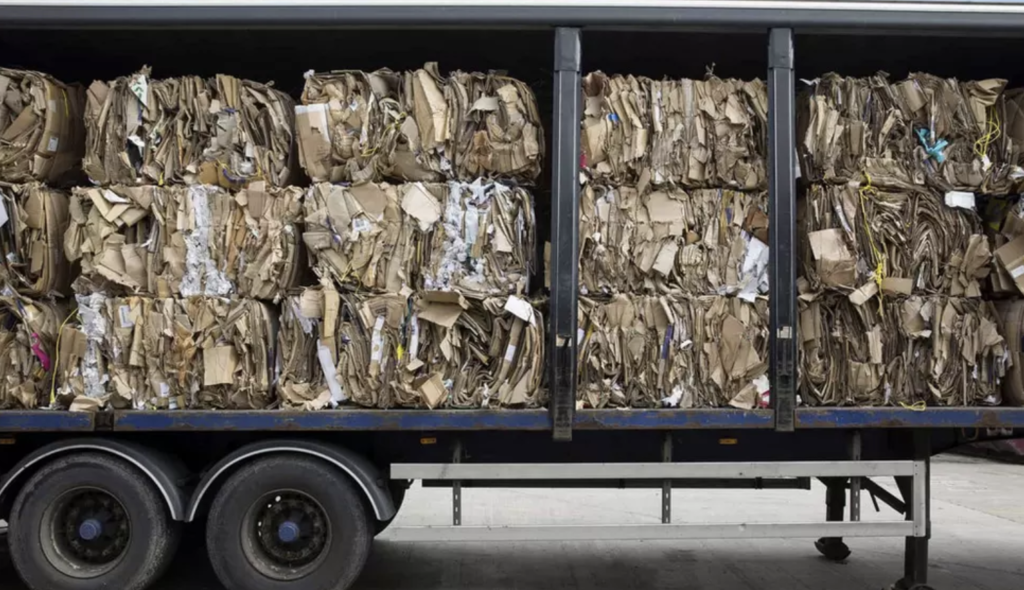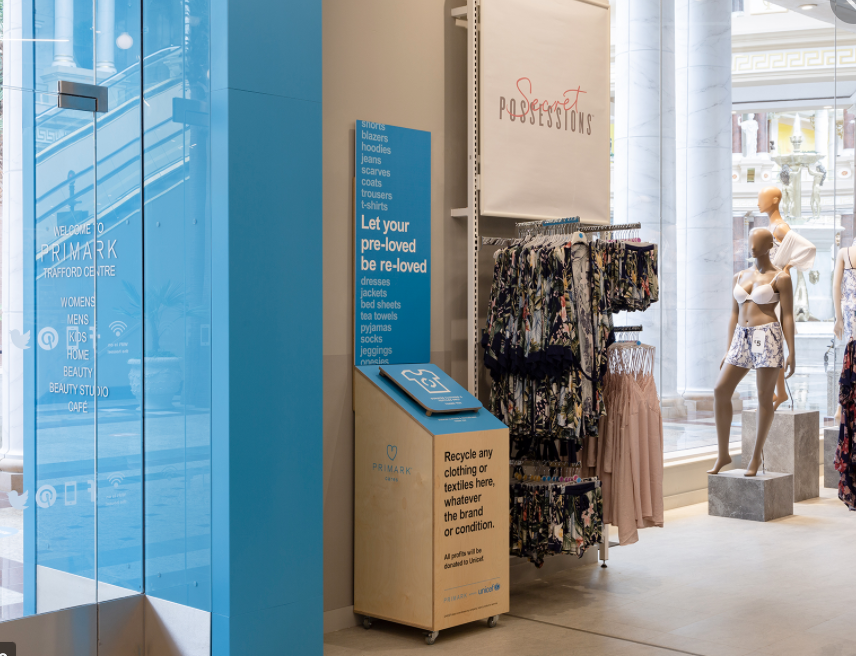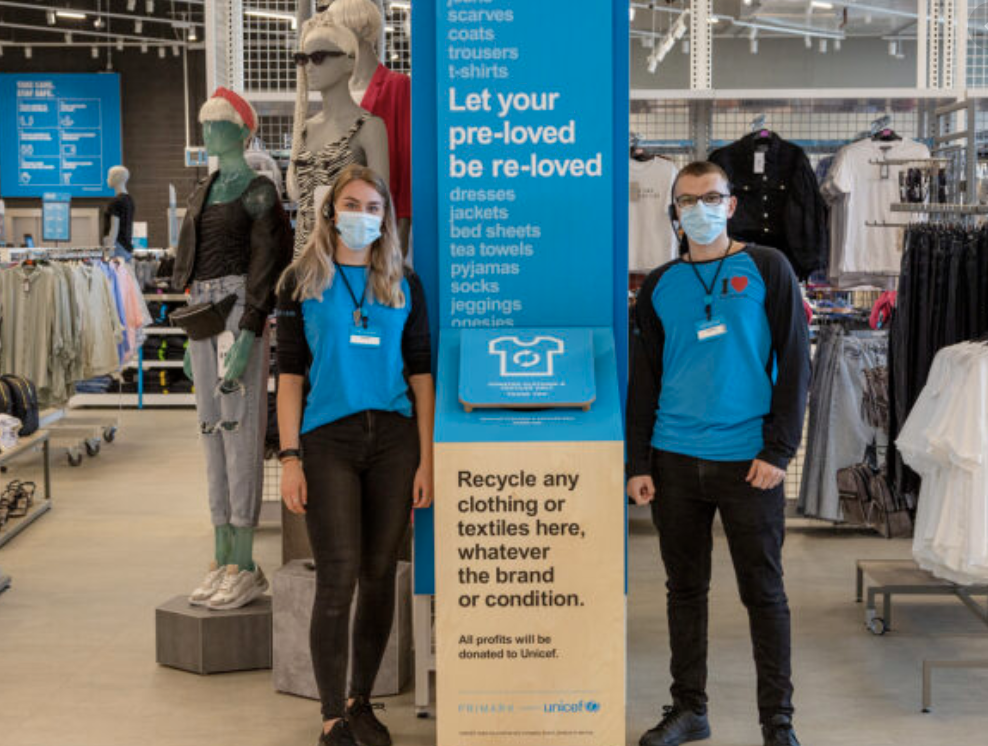
Globally, an estimated 92 million tons of textile waste is created each year, and by 2030, we are expected as a whole to be discarding more than 134 million tons of textile a year, and Primark has become the latest retailer to help solve this issue. Primark isn’t alone however, following the footsteps of other retail giants, H&M and Zara have also implemented in-store recycling schemes, which allow customers to drop off unwanted clothing in ‘bins’.

This campaign however arrived with very little advertising and endorsement, and was said to have just ‘appeared’ in stores. Primark famously have a very limited marketing strategy and rely heavily on word of mouth and the use of their brown paper bags, they have only recently in the past few years ventured onto social media. Because of these factors and the global pandemic hitting when it did, the campaign hasn’t been very successful in engaging the consumers.
A Primark spoked person claims that “we want to find a good home for any clothes that we don’t sell”. Since 20012 they have been donating unsold clothing and samples to the charity Newlife, Newlife specialises in providing support for disabled and terminally ill children and their families (Planet Recycling, Primark 2020). They also have a ‘backhauling’ process where their UK stores collect their carboard, plastics and hangers for onward recycling or energy recovery. They also ask for their customers to be actively involved in the recycling process as almost every Primark store in the UK have collection boxes where customers can leave their unwanted clothing. All donations made will be reused, recycled or repurposed, with supposedly nothing going to landfill, and profits made are donated to Primark’s global charity partner ‘UNICEF’ (Newsroom, 2020). All these efforts in sustainability and recycling have been made to help improve the brands image.
Peter Maddox, Director, WRAP: “Our research shows most people prefer to donate or recycle their unwanted clothes, and often opt for charity shops as their favoured route. Primark is a signatory of the Sustainable Clothing Action Plan, and this new in-store recycling scheme for clothes gives people even more options.” (Newsroom, 2020).

According to WRAP (Waste and Resources Action Programme) around two in five UK citizen have disposed of clothing during the COVID-19 lockdown. Consumers are being urged to protect charity shops from an influx of donations, by using other options like Primark’s in-store drop off scheme (Newsroom, 2020). Primark say that the in-store recycling scheme is the latest step in its wider Primark Cares initiative, which also features and investment in the use of sustainable fibres across all product ranges. Primark’s sustainability director Katherine Stewart said “Now is the perfect time to be launching our in-store recycling programme… This will reduce waste going to landfill and help our customers to help the environment.”
However, Primark is famously known as the shop of all things fast fashion and cheap clothing, so how do we know this isn’t just another attempt of ‘Greenwashing’? Any fashion brand that bases its business model on fast fashion can put out as many recycling bins as possible and still will not only have zero impact but a negative impact on the environment because of the quality of clothes they sell, says Dana Thomas, author of Fashionopolis ‘The Price of Fast Fashion and the Future of Clothes’ (Naomi May,2020).
Like everything collecting clothes is only half of the sustainable battle. According to a 2017 report (A new textiles economy, 2017), less than 1% of clothing materials are recycled into new clothing, the remaining 99 per-cent finding a home in the form of insulation or mattress stuffing.
This campaign was initially created to positively reflect upon Primark and their brand image, and justify for the consumer that it’s ok to buy from Primark because they recycle. Both of Primark’s campaigns ‘Primark Cares’ and their in-store recycling scheme paints the storyline of the company being socially and environmentally responsible, even though to the trained eye it’s only greenwashing. Therefore, no matter how hard Primark tries the story of “caring” it may not be reflected positively on the brand, and even though the Primark is trying to reflect the current social change. It’s almost impossible for Primark to be viewed as sustainable and ‘green’, due to their negative stigma of underpaying garment workers and the collapse of their factories in third-world-countries.
“Brands need to wake up and think, ‘Now we’ve got this product, what more can we do with it once the consumer is finished with it?’ Retail is riddled with inefficiencies and it’s about getting to the heart of the inefficiencies,” the director of Girlfriend Collective – recycled activewear brand (Naomi May,2020).
References:
Ellen Macarthur (2017) A New Textiles Economy: redesigning Fashion’s Future, Available at: https://www.ellenmacarthurfoundation.org/assets/downloads/publications/A-New-Textiles-Economy_Full-Report.pdf (Accessed: 18/04/2021)
Naomi May (2020), “This exercise is greenwashing at its absolute worst”: the truth about fashion’s recycling bins”, Evening Standard, 5 August 2020, Available at: https://www.standard.co.uk/insider/fashion/fashion-recycling-bins-primark-fast-fashion-sustainability-a4512311.html (Accessed: 18/04/2021)
Newsroom (2020), Primark, 29 July 2020, Available at: https://www.primark.com/en/primark-cares/newsroom/primark-launches-new-uk-in-store-recycling-scheme/a/57c4868c-94cb-43d9-b501-6f84d3da2cd7 (accessed: 18/04/2021)
Planet Recycling (2020), Primark, Available at: https://www.primark.com/en/primark-cares/planet/recycling/a/a896b3f6-be42-494f-a10e-9c6f7ef54bab (Accessed: 18/04/2021)

